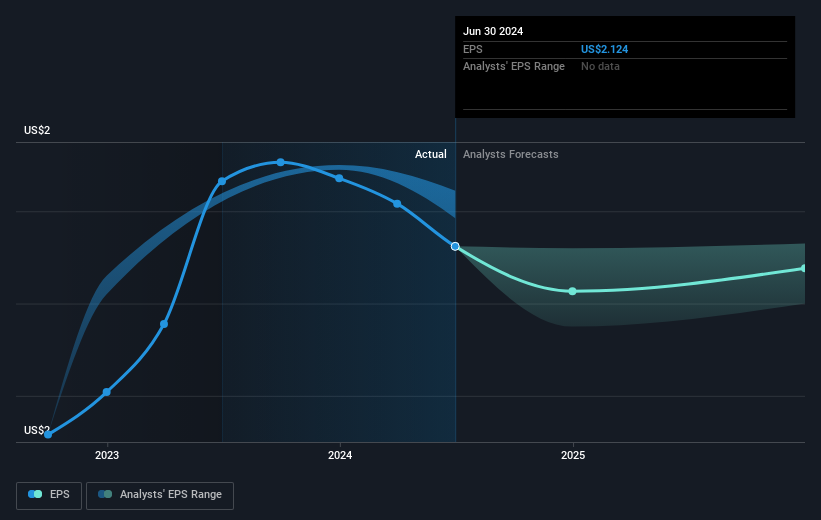- United States
- /
- Banks
- /
- NasdaqGS:BCML
BayCom's (NASDAQ:BCML) earnings growth rate lags the 7.0% CAGR delivered to shareholders

The BayCom Corp (NASDAQ:BCML) share price has had a bad week, falling 11%. But that doesn't change the fact that the returns over the last three years have been pleasing. After all, the share price is up a market-beating 18% in that time.
While this past week has detracted from the company's three-year return, let's look at the recent trends of the underlying business and see if the gains have been in alignment.
Check out our latest analysis for BayCom
In his essay The Superinvestors of Graham-and-Doddsville Warren Buffett described how share prices do not always rationally reflect the value of a business. One flawed but reasonable way to assess how sentiment around a company has changed is to compare the earnings per share (EPS) with the share price.
BayCom was able to grow its EPS at 13% per year over three years, sending the share price higher. This EPS growth is higher than the 6% average annual increase in the share price. Therefore, it seems the market has moderated its expectations for growth, somewhat. This cautious sentiment is reflected in its (fairly low) P/E ratio of 9.61.
The graphic below depicts how EPS has changed over time (unveil the exact values by clicking on the image).

Dive deeper into BayCom's key metrics by checking this interactive graph of BayCom's earnings, revenue and cash flow.
What About Dividends?
When looking at investment returns, it is important to consider the difference between total shareholder return (TSR) and share price return. The TSR is a return calculation that accounts for the value of cash dividends (assuming that any dividend received was reinvested) and the calculated value of any discounted capital raisings and spin-offs. Arguably, the TSR gives a more comprehensive picture of the return generated by a stock. As it happens, BayCom's TSR for the last 3 years was 23%, which exceeds the share price return mentioned earlier. This is largely a result of its dividend payments!
A Different Perspective
BayCom shareholders gained a total return of 6.7% during the year. But that was short of the market average. The silver lining is that the gain was actually better than the average annual return of 0.3% per year over five year. It is possible that returns will improve along with the business fundamentals. It's always interesting to track share price performance over the longer term. But to understand BayCom better, we need to consider many other factors. For example, we've discovered 2 warning signs for BayCom (1 makes us a bit uncomfortable!) that you should be aware of before investing here.
Of course, you might find a fantastic investment by looking elsewhere. So take a peek at this free list of companies we expect will grow earnings.
Please note, the market returns quoted in this article reflect the market weighted average returns of stocks that currently trade on American exchanges.
Valuation is complex, but we're here to simplify it.
Discover if BayCom might be undervalued or overvalued with our detailed analysis, featuring fair value estimates, potential risks, dividends, insider trades, and its financial condition.
Access Free AnalysisHave feedback on this article? Concerned about the content? Get in touch with us directly. Alternatively, email editorial-team (at) simplywallst.com.
This article by Simply Wall St is general in nature. We provide commentary based on historical data and analyst forecasts only using an unbiased methodology and our articles are not intended to be financial advice. It does not constitute a recommendation to buy or sell any stock, and does not take account of your objectives, or your financial situation. We aim to bring you long-term focused analysis driven by fundamental data. Note that our analysis may not factor in the latest price-sensitive company announcements or qualitative material. Simply Wall St has no position in any stocks mentioned.
Have feedback on this article? Concerned about the content? Get in touch with us directly. Alternatively, email editorial-team@simplywallst.com
About NasdaqGS:BCML
BayCom
Operates as the bank holding company for United Business Bank that provides various financial services to small and mid-sized businesses, service professionals, and individuals.
Flawless balance sheet and undervalued.

